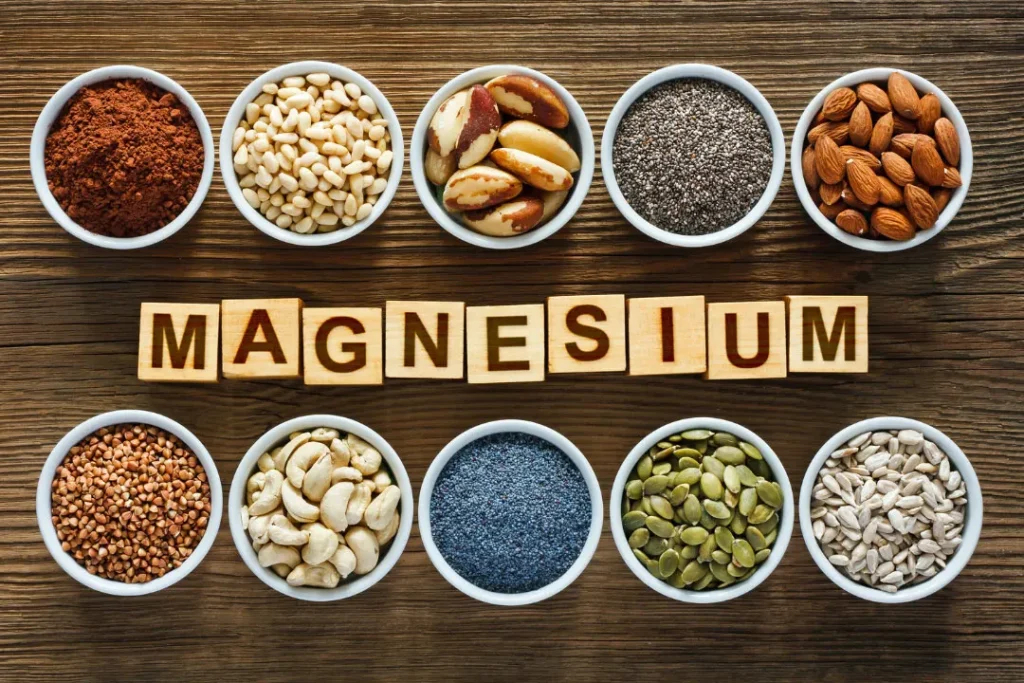Magnesium is a necessary mineral that is required for numerous biological processes, such as generating energy, maintaining strong bones, and controlling blood pressure. Magnesium has been demonstrated to improve memory, learning, and cognition when used as a nootropic supplement. We will go through the nature of magnesium, its health advantages, the recommended dosage, side effects, possible drug interactions, and safe usage in this article.
You May Also Like:
Adventa Bioscience Is an Innovator in Human Breast Milk Supplements
Oxidative Stress Supplements, and How They Work at the Cellular Level: MitoQ Has Promising Answers
Nature of Magnesium
Magnesium is a crucial mineral needed for a variety of biological processes. Almost 300 metabolic processes in the body depend on it, including those that provide energy, maintain strong bones, and control blood pressure. Magnesium can be found in a variety of foods, such as whole grains, nuts, and leafy green vegetables. Yet, many people may need to take magnesium supplements as they may not consume enough magnesium in their diets.

Health Benefits of Magnesium
Magnesium has been demonstrated to enhance cognitive function, including memory, attention, and reaction time. Dopamine and serotonin are the two neurotransmitters that are necessary for cognitive function and both of them depend on magnesium to operate properly.
2. Increased Energy: Magnesium is essential for the creation of energy. It is necessary for the synthesis of adenosine triphosphate (ATP), the body’s main source of energy. Fatigue and poor energy levels are consequences of magnesium insufficiency.
3. Better Bone Health: Magnesium is crucial for maintaining strong bones. It is necessary for the metabolism and absorption of calcium. Calcium is crucial for the health of your bones.
4. Better Cardiovascular Health: Magnesium is essential for controlling blood pressure. Hypertension, which is a risk factor for cardiovascular disease, can result from a magnesium deficit.


Chemistry of Magnesium
Magnesium is a mineral that the body uses in a variety of metabolic processes. The group of metals known as alkaline earth metals includes magnesium. It has an atomic weight of 24.31 and an atomic number of 12. Magnesium is a white or silvery-white, gleaming metal that is somewhat pliable and soft.
Physiological Mechanism of Action of Magnesium
Magnesium’s physiological mechanism of action is intricate and it is still not fully understood yet. Nonetheless, as previously stated, research indicates that magnesium is important for a variety of body processes, such as the generation of energy, the preservation of strong bones, and the control of blood pressure.
The body uses magnesium to synthesize ATP and maintain proper cognitive function. The metabolism and absorption of calcium also depend on magnesium, which means that a lack of magnesium can result in a loss of bone mass and a higher chance of developing osteoporosis. The interaction of magnesium and calcium also reduces peripheral vascular resistance and helps the body control blood pressure.


Optimal Dosage of Magnesium
The best amount of magnesium to take depends on your age, sex, and general health. For the majority of adults, a daily dose of 300–400 mg is advised. The suggested daily dose is higher for expectant women, at 350–400 mg per day.
Side Effects of Magnesium
When used at acceptable doses, magnesium is generally safe for the majority. However, taking excessive amounts of magnesium may result in negative side effects, such as:
• Nausea
• Diarrhea
• Stomach cramps
• Dizziness
In rare cases, taking excessive amounts of magnesium can also result in magnesium toxicity, which can have detrimental effects on your health.


Potential Substance Interactions with Magnesium
Medication interactions: Antibiotics, diuretics, and blood pressure medications are just a few of the drugs that magnesium may interact with. If you are taking medication, it is crucial to speak with a healthcare provider before using magnesium supplements.
Hence, if you are using any other supplements, it is crucial to speak with a healthcare provider before taking magnesium supplements.
Best Responsible Use of Magnesium
The best and most ethical way to use magnesium as a dietary supplement is to prioritize getting it through a varied and well-balanced diet. This is because many meals that are high in nutrients, like whole grains, nuts, and leafy green vegetables, also contain magnesium. Nonetheless, the use of magnesium supplements might be considered with caution and moderation in circumstances where people are unable to obtain sufficient amounts of the mineral from their meal intake.
myPEAK Wellness, a product provided by myPEAK Supplements, is one reliable source of magnesium supplements. This supplement contains a synergistic type of magnesium that is highly bioavailable and intended to support cognition. MyPEAK Wellness is specially formulated to maximize the body’s ability to absorb and use magnesium while decreasing the risk of toxicity and unfavorable side effects. Also, it is crucial to follow the dosage recommendations provided on the myPEAK Wellness label or as suggested by a licensed healthcare provider.
Recognizing that magnesium supplements shouldn’t be used as a replacement for a balanced diet is crucial. So, it is advised to combine magnesium supplementation with a healthy lifestyle that includes regular exercise, enough sleep, and stress reduction. Using this strategy enables people to maximize the advantages of magnesium supplementation while promoting their general health and wellness.
Magnesium:
Conclusion
Magnesium is pivotal as an element that is used in different biochemical pathways in the body such as ATP generation and absorption of calcium. The lack of magnesium can result in many negative effects including lack of energy, weak bones, and cardiovascular health.
Thus, if you are seeking to improve your overall health and wellness, you should look into supplements like myPEAK Wellness which contains a synergistic and bioavailable form of magnesium. This supplement is formulated to maximize the health benefits of magnesium and also reduce the risk of intoxication due to an overdose of magnesium. However, it is still important for you to take note of the appropriate dosage for you and always refer to a doctor or a medical practitioner.
References
- Assessment of Cognitive Function Following Magnesium Therapy in The Traumatically Injured Brain. Link: https://pubmed.ncbi.nlm.nih.gov/18271492/
- The Role of Magnesium Therapy in Learning and Memory. Link: https://www.ncbi.nlm.nih.gov/books/NBK507270/
- Association Between Magnesium Intake and Cognition In US Older Adults: National Health and Nutrition Examination Survey (NHANES) 2011 To 2014. Link: https://www.ncbi.nlm.nih.gov/pmc/articles/PMC8804621/
Important Note: The information contained in this article is for general informational purposes only, and should not be construed as health or medical advice, nor is it intended to diagnose, prevent, treat, or cure any disease or health condition. Before embarking on any diet, fitness regimen, or program of nutritional supplementation, it is advisable to consult your healthcare professional in order to determine its safety and probable efficacy in terms of your individual state of health.
Regarding Nutritional Supplements Or Other Non-Prescription Health Products: If any nutritional supplements or other non-prescription health products are mentioned in the foregoing article, any claims or statements made about them have not been evaluated by the U.S. Food and Drug Administration, and such nutritional supplements or other health products are not intended to diagnose, treat, cure, or prevent any disease.
Table of Contents


